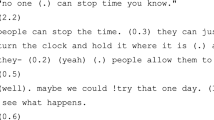Abstract
This paper presents the results of a study conducted with second grade students and pre-service teachers. This study examined the possibilities for engaging children in critical discourse about their classroom science experiences. At the heart of this discussion lies the desire to provide a space for teachers and children to develop relationships and to explore the learning of science together. Themes that emerged include: (1) on-going, focused, critical dialogue between children and teachers supported children in developing agency in the classroom, and (2) on-going conversations created the opportunity for children to reveal their ways of knowing and developing interpretations of the practice of science.
Similar content being viewed by others
Notes
“Teacher participants” is used to denote all teachers that participated in the cogenerative dialogues; the pre-service teachers, classroom teachers, and professors.
Pre-service teacher and students names are pseudonyms to protect participants’ privacy.
References
Brown, A. L. (1992). Design experiments: Theoretical and methodological challenges in creating complex interventions in classroom settings. The Journal of the Learning Sciences, 2, 141–178.
Carspecken, P. (1996). Critical ethnography in educational research: A theoretical and practical guide. New York: Routledge.
Dahlberg, G., Moss, P., & Pence, A. (1999/2006). Beyond quality in early childhood education and care: Postmodern perspectives. New York: Routledge Falmer.
Dillon, S. (2006). Schools cut back subjects to push reading and math. The New York Times, pp. 1, 22.
Dockett, S., & Perry, B. (2007). Trusting children’s accounts in research. Journal of Early Childhood Research, 5(1), 47–63.
Elmesky, R., & Tobin, K. (2005). Expanding our understandings of urban science education by expanding the roles of students as researchers. Journal of Research in Science Teaching. Vol, 42(7), 807–828.
Fleer, M., & Raban, B. (2006). A cultural-historical analysis of concept formation in early childhood settings: Conceptual consciousness for the child or only the adult? European Early Childhood Education Research Journal, 14(2), 69–80.
Giroux, H. A. (2000). Stealing innocence: Corporate culture’s war on children. New York: Palgrave books.
Guba, E. G., & Lincoln, Y. S. (1989). Fourth generation evaluation. Newbury, CA: SAGE Publications.
Iorio, J. M. (2006). Rethinking conversations. Contemporary Issues in Early Childhood, 7, 281–289.
Lang, D. E. (2003). “Why are you here?”: A novice researcher explores the ethics and dilemmas of explaining research goals to very young children. Chicago, IL: In Science and Early Childhood Education Round Table Discussion at the Annual Meeting of the American Educational Research Association.
Martin, S. (2005). The social and cultural dimension of successful teaching and learning of science in an urban high school. Unpublished doctoral dissertation, Curtin University of Technology, Australia.
Martin, S. N., & Scantlebury, K. (2009). More than a conversation: Using cogenerative dialogues in the professional development of high school chemistry teachers. Educational Assessment, Evaluation, and Accountability, 21, 119–136.
Roth, W.-M. (2005). Doing qualitative research: Praxis of method. Rotterdam: Sense Publishers.
Roth, W.-M., & Tobin, K. (2002). At the elbow of another: Learning to teach through coteaching. New York: Peter Lang.
Schemo, D. J. (2006). Most students in big cities lag badly in basic science. The New York Times, pp. 1, 22.
Sewell, W. H. (1999). The concept(s) of culture. In V. E. Bonell & L. Hunt (Eds.), Beyond the Cultural Turn (pp. 35–61). Berkeley: University of California Press.
Siry, C. (2009). Fostering solidarity and transforming identities: A collaborative approach to elementary science teacher education, Unpublished doctoral dissertation, The Graduate Center, City University of New York.
Siry, C., Horowitz, G., Otulaja, F. S., Gillespie, N., Shady, A., & Augustin, L. A. (2008). Conceptual change research and science education practice: A response from educators. Cultural Studies of Science Education, 3(2), 451–470.
Siry, C., Martin, S., Baker, S., Lowell, N., Marvin, J., & Wilson, Y. (2010). Coteaching in science education courses: Transforming teacher education through shared responsibility. In C. Murphy & K. Scantlebury (Eds.), Coteaching in international contexts: Research and practice (pp. 57–78). Rotterdam: Springer Press.
Stith, I. (2007). Cogenerative dialogue praxis in a lighthouse school: Contradictions, ethical concerns, expansive learning, and “kids being kids.” Unpublished doctoral dissertation, University of Victoria, Canada.
Tobin, K., & Roth, W.-M. (2006). Teaching to learn: A view from the field. Rotterdam: Sense Publishers.
Viruru, R., & Cannella, G. S. (2001). Postcolonial ethnography, young children, and voice. In S. Grieshaber & G. S. Cannella (Eds.), Embracing identities in early childhood education: Diversity and possibilities (pp. 158–172). New York: Teachers College Press.
Author information
Authors and Affiliations
Corresponding author
About this article
Cite this article
Siry, C.A., Lang, D.E. Creating Participatory Discourse for Teaching and Research in Early Childhood Science. J Sci Teacher Educ 21, 149–160 (2010). https://doi.org/10.1007/s10972-009-9162-7
Published:
Issue Date:
DOI: https://doi.org/10.1007/s10972-009-9162-7



